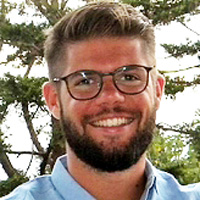



Tito Panciera, si è laureato nel 2012 in Biologia Molecolare presso l’Università degli Studi di Padova, sostenendo una tesi sperimentale sullo studio dell’interazione tra le vie di trasduzione del segnale di Wnt e Hippo. Nel 2016 ha conseguito presso l’Università degli Studi di Padova il Dottorato di Ricerca in Bioscienze con una tesi dal titolo “YAP/TAZ and somatic stem cells”. Attualmente è titolare di un assegno di ricerca presso il Dipartimento di Medicina Molecolare dell’Università di Padova, dove si occupa sotto la supervisione del Prof. Stefano Piccolo dello studio del ruolo di YAP/TAZ nel fenomeno della plasticità cellulare e dello sviluppo tumorale.
De novo generation somatic stem cells by YAP/TAZ
Primary adult stem cells of given organs – when seeded in the appropriate culture conditions – are endowed with the ability to self-organize into organoids that acquire an ordered tissue architecture, characterized by multilineage differentiation reminiscent of in vivo tissues. Organoids hold the advantage of recapitulating distinctive features of in vivo tissue biology and can be propagated in vitro for long periods of time, preserving genetic integrity. Still, efforts towards effective organoid derivation to understand SC biology and for disease modeling in vitro remain limited by the fact that SCs are rare and difficult to purify or expand from native tissues. We found that transient expression of exogenous YAP, or its closely-related paralogue TAZ, in primary differentiated mouse cells can induce conversion to a tissue-specific stem/progenitor cell state. Differentiated mammary gland, neuronal, and pancreatic exocrine cells, identified using a combination of cell sorting and lineage tracing approaches, efficiently convert to proliferating cells with properties of stem/progenitor cells of their respective tissues after YAP induction. YAP/TAZ-induced SCs (or “ySCs”) can be cultured long-term without signs of transformation or loss of differentiation potentials, comparably to endogenous tissue-derived SCs. YAP-induced mammary stem/progenitor cells show molecular and functional properties similar to endogenous MaSCs, including organoid formation and mammary gland reconstitution after transplantation. Importantly, through conditional knockout experiments, we also identified YAP/TAZ as the key endogenous factors required for self-renewal and expansion of mammary and pancreatic organoids and neural stem cells. This finding has implications for understanding the molecular determinants of the somatic stem cell state and may hold broader significance for a better understanding of the dynamics of tissue organization and for disease modeling.